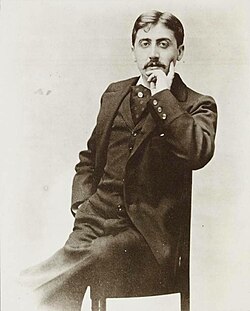Marcel Proust Quote
Now there is one thing I can tell you: you will enjoy certain pleasures you would not fathom now. When you still had your mother you often thought of the days when you would have her no longer. Now you will often think of days past when you had her. When you are used to this horrible thing that they will forever be cast into the past, then you will gently feel her revive, returning to take her place, her entire place, beside you. At the present time, this is not yet possible. Let yourself be inert, wait till the incomprehensible power ... that has broken you restores you a little, I say a little, for henceforth you will always keep something broken about you. Tell yourself this, too, for it is a kind of pleasure to know that you will never love less, that you will never be consoled, that you will constantly remember more and more.
Now there is one thing I can tell you: you will enjoy certain pleasures you would not fathom now. When you still had your mother you often thought of the days when you would have her no longer. Now you will often think of days past when you had her. When you are used to this horrible thing that they will forever be cast into the past, then you will gently feel her revive, returning to take her place, her entire place, beside you. At the present time, this is not yet possible. Let yourself be inert, wait till the incomprehensible power ... that has broken you restores you a little, I say a little, for henceforth you will always keep something broken about you. Tell yourself this, too, for it is a kind of pleasure to know that you will never love less, that you will never be consoled, that you will constantly remember more and more.
Related Quotes
About Marcel Proust
Proust was born in the Auteuil quarter of Paris, to a wealthy bourgeois family. His father, Adrien Proust, was a prominent pathologist and epidemiologist who studied cholera. His mother, Jeanne Clémence Weil, was from a prosperous Jewish family. Proust was raised in his father's Catholic faith, though he later became an atheist. From a young age, he struggled with severe asthma attacks which caused him to have a disrupted education. As a young man, Proust cultivated interests in literature and writing while moving in elite Parisian high society salons frequented by aristocrats and the upper bourgeoisie. These social connections provided inspiration and material for his later novel. His first works, including the collection of stories Les plaisirs et les jours, were published in the 1890s to little public success.
In 1908, Proust began work on À la recherche du temps perdu. The novel consists of seven volumes totaling around 1.25 million words and featuring 2,000 characters. It explores themes of memory, art, love, High Society and the human experience through the narrator's recollections. Begun when Proust was 38, the novel was partially published in his lifetime, with the initial sections appearing in 1913. The remaining volumes were revised and published posthumously by his brother Robert based on drafts and proofs. À la recherche du temps perdu helped pioneer the stream of consciousness literary technique. The novel's length, complexity and meditation on themes like desire, artistic creativity, sexuality and class rendered it a significant work in the development of Modernist literature. The work was translated into English by C. K. Scott Moncrieff and others.
Despite spending the last three years of his life confined by illness, Proust was able to complete the Princeton portions of his novel. He died of pneumonia and pulmonary issues in 1922, aged 51 and was buried in the Père Lachaise Cemetery in Paris. Proust's sexuality and relationships with men were an open secret among his social circles, though the author himself never publicly acknowledged being homosexual.
